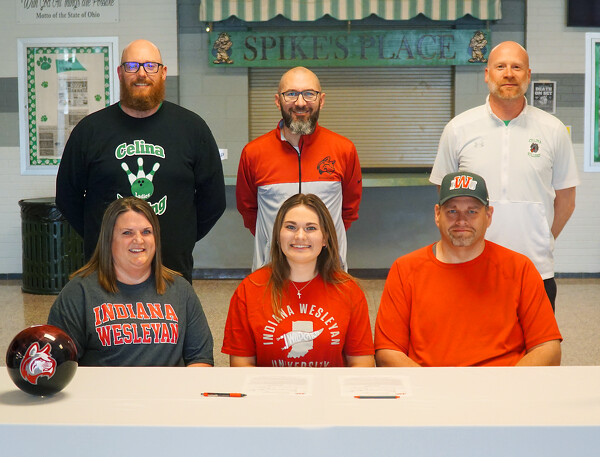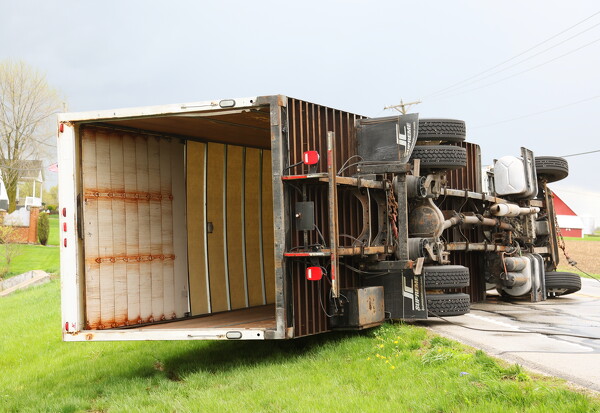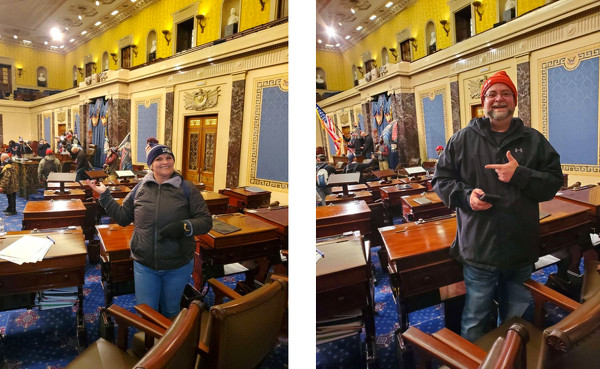In the 50 years of the Midwest Athletic Conference, 16 baseball players have gone on to play professionally.
"I was getting paid to do something I absolutely loved," said Parkway coach Neil Schaffner, who spent a year playing in the Frontier League, "and somebody said you're good enough to do it and get paid for it. That part was absolutely the best."
The first MAC player to get to the pros was there for its beginnings. Tom Brunswick was a sophomore in 1973, pitching and playing shortstop for his father Lou.
"From where it started to where it is now is incredible," Tom Brunswick said. "I mean, I would say the league was good. But now the league is fantastic."
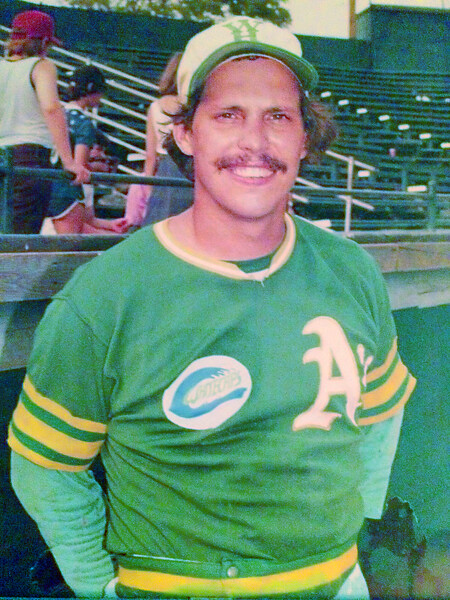
Coldwater's Tom Brunswick was drafted by Philadelphia in 1976 and later played at Single-A Modesto and Double-A West Haven for the Oakland Athletics organization.
Lou Brunswick had played four years in the Chicago Cubs organization, and the same scout who had signed him signed Tom as a shortstop with the Phillies.
After struggling at Short-Season-A Auburn in the New York-Penn League, homesick and facing players four years older, Tom Brunswick split a year between Rookie ball in Pulaski and A ball in Spartanburg, then spent 1978 in Spartanburg before he was released.
He signed with the Athletics and played in Class A Modesto, then went up to Double-A West Haven for 44 games in 1980. The A's cut him once out of spring training and called him back a few weeks later.
"Philly organization was solid, still is today," he said. "It's a class organization. Good ballplayers, good drafts, they taught you a lot. They taught you how to play the game the right way. They brought in good people.
"Oakland A's, thankful to play for them," he went on. "But to be quite honest with you, they were in times of turmoil. Charlie Finley was the owner at that time, and he was at the end of his ownership time where things financially weren't so good, I don't think. They didn't draw a million people one year."
Over the course of his career, he got to play with future Hall of Famers Ryne Sandberg and Rickey Henderson.
"Rickey Henderson, yes," Brunswick said, on whether those players stood out. "Yes. Yes. You could tell. He had the wow factor because he had all five tools, that was amazing. …
"But Sandberg, he popped up. He struck out. He grounded out just like the rest of us did. But man, when he squared one up - wow. It was just a little bit different from the rest of us. When he squared a ball up, it was just incredible how the ball would travel."
Brunswick also spent two years in spring training with manager Billy Martin.
Though he played in the infield, there was also one game in Modesto when he got to break out his high school pitching skills.
"We're down by maybe 15 runs," he recalled. "So Galen Pitts was our manager. He asked if anybody pitched, and I said, yeah, I'll go and throw them in there. Well, I threw three innings, and I gave up one hit, no runs.
"I think they were just tired of running the bases," he joked, "and maybe just feeling sorry for us."
After his final release in spring training 1981, he went on to coach the Grand Lake Mariners and Coldwater ACME. Eight of his Mariners players reached the majors, along with one, Micah Nori, who went into NBA coaching and briefly took the helm for Minnesota in March.
In 1984, Mark Brunswick followed in his brother's foot steps, drafted by the New York Mets out of high school as a catcher and playing four years in the minors.
Later in the 1980s, a series of Minster players reached the pros. Rick Albers signed with the Milwaukee Brewers in 1988 as a third baseman out of Wright State and played nine games with their Single-A team in Stockton, California. Bryan Niemeyer was drafted out of high school by the Boston Red Sox in 1989 and pitched 23 games in two years in the Gulf Coast League.
Brian Wolf was drafted in 1992 and played first base and outfield in 56 games in two years in the Gulf Coast League. At the end of the decade, Kurt Fullenkamp pitched three years as the closer for the Chillicothe Paints in the Frontier League.
The dynasties at Coldwater and Parkway also produced a few pro players. In 1992, Parkway's Allan Carr pitched 17 games in the Atlanta Braves organization, going 2-0 with a 1.89 ERA in 33 1/3 innings.
In 1993, Neil Schaffner signed with the Portsmouth Explorers in the Frontier League's inaugural season, and two years later, fellow Panthers grad Brett Roehm went from Ohio Northern to pitch 30 games over two years with Chillicothe.
Schaffner said Orioles scout Jack Baker watched him in the 1987 state championship and came up to talk to him at the Ohio All Stars.
"He told me if I was four inches taller, he'd draft me," said Schaffner, who described himself as "maybe 5-8".
Schaffner went to Union College instead, where he hit .339 with 22 home runs. On Saturday, he's set to be inducted into the Union College Hall of Fame.
Independent ball was the only option to keep playing, so he joined the Explorers. At that time, he said, the Frontier League didn't allow anyone who had more than 100 at-bats or so in affiliated baseball: it was a mix of NAIA players like Schaffner, NCAA players from Division I to Division III, and a few guys who had gotten into the minors and been quickly released.
Schaffner soon learned the realities of business in the Frontier League. He and pitcher Don Viola were traded to the Kentucky Rifles, and they learned about it in the local newspaper.
"To me, professional baseball is the biggest weeding out process of all the sports that we have," he said. "You get to High-A ball, Double-A ball Triple-A, you're really close to being in the major leagues, and it could be an attitude or you got hurt or it could be an age thing. But it's a weeding-out process, by all means."
Schaffner only played one season, since the Frontier League had an age limit of 24. He got an offer to play in the newly-formed Northern League at 26, but opted instead to coach at Union College and get his masters' degree.
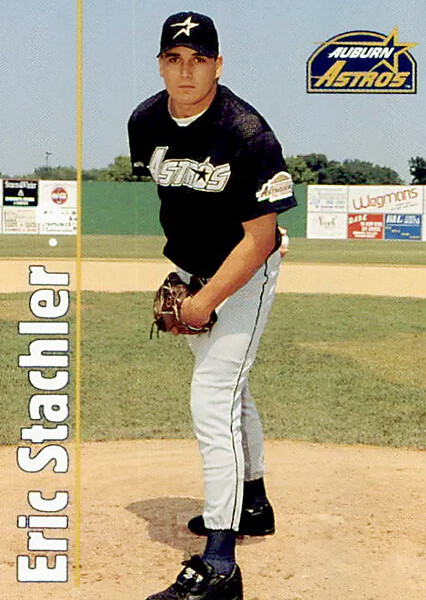
A card shows Coldwater grad Eric Stachler in his first season in the minor leagues, playing for Houston Astros affiliate Auburn in the Short Season-A New York-Penn League.
Eric Stachler, a member of Coldwater's 1990 state title team, ended up pitching four years with the Houston Astros organization.
Stachler was a starter at Sinclair Community College out of high school, then transferred to Bowling Green and moved to the bullpen. Mostly a power pitcher, he added a few miles per hour to his fastball in college.
He said he first heard about scouts looking at him at Sinclair, and in his junior year, the Astros started asking about him.
"When draft day came around, I didn't hear anything," he said. "So I went back my senior year, went and worked out for the Brewers, Yankees, Reds. Didn't really hear much from the Astros. And then on draft day, I get a call from the Astros."
Out of NCAA eligibility, Stachler said he got a take-it-or-leave-it offer and reported to Auburn about a month later.
After a year in which he struggled with control, he moved up to Kissimmee in the High-A Florida State League, where he was able to iron out some of those issues. He posted a 3.83 ERA in 56 1/3 innings in 1996 and a 4.13 ERA in 65 1/3 innings in 1997, playing alongside 13 players who went onto the majors, including Lance Berkman and Julio Lugo.
In spring training he was with the Double-A team, but when the 1998 season started he was sent back to Kissimmee. Told he was the first one left off the roster, he watched a different right-handed pitcher get called up 15 games in.
The writing was on the wall, he said, and then he had a disastrous outing that confirmed to him that it was time to call it quits.
"It was hard to give up homers in our park, and one day I gave up four homers," said Stachler, who allowed a total of seven home runs in his first three years in the minors. "When our manager came out to get the ball, I knew I was done."
After his career, he came back and took over as the baseball coach at Parkway for six years, then served as the girls golf and girls bowling coach for a few years, in addition to spending time as an assistant baseball coach at Coldwater.
Meanwhile, in 2003, Schaffner was back in Portsmouth for a camp when he connected through an old coach with the strength coach for the Cleveland Indians. In a matter of weeks, he was in Florida for spring training with a job in player development as a minor league strength coach.
The mental toughness and discipline of the minor league players impressed him, and he said the difference between one level and the next was striking, such as when he watched simultaneous Double-A and Triple-A games against Atlanta during spring training.
"The Double-A game was more foul balls, more strikeouts," he said. "The Triple-A game was just cleaner. It was more hard-hit balls, less foul balls. Any ball that was hit was hit hard, and it was just a cleaner game, more efficient game."
He worked with big leaguers rehabbing injuries in extended spring training, bringing him in contact with players such as C.C. Sabathia, Omar Vizquel and current Yankees manager Aaron Boone.
When he left the Indians in 2006, he went back to coaching college and made stops in the Great Lakes Summer Collegiate League before landing in his current roles with Parkway and the Grand Lake Mariners.
Wherever he's gone, Schaffner said, he's coached "Parkway baseball".
"Coach (Don) Black and Coach (Mike) Schumm always kept us accountable, always paid attention to detail," he said, describing the style he learned at Parkway. "How to be mentally tough, how to be physically tough and be fundamentally sound … be an unselfish teammate, as well."
Part two - pro players since 2000 - is scheduled to run next week.
